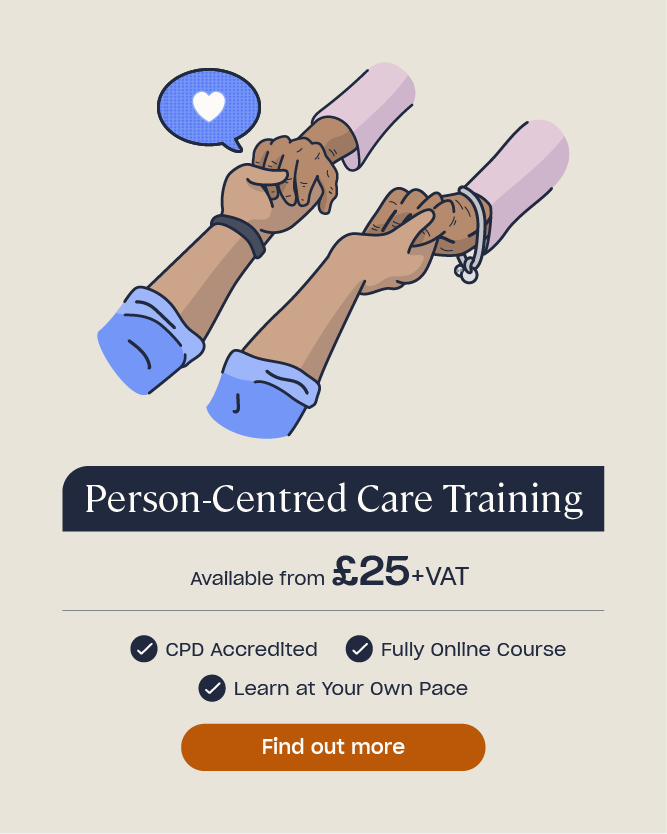What is Person-Centred Care and Why is it Important?
The ever-increasing demand on healthcare often causes caregivers to lose sight of the person behind the condition they’re treating. This is why person-centred care is so important. It helps carers refocus on a crucial aspect of care: fulfilling a patient’s needs beyond their disability or ailment.
The health and social care sector is increasingly adopting a person-centred care approach, and rightly so. Not only does it help patients receive better quality care, but it also improves healthcare settings as a whole.
As a carer, you should learn about the benefits of providing person-centred care and how to apply it in practice. It’ll help you fulfil your role to the best of your abilities and maximise your patients’ quality of life.
What is Person-Centred Care?
Person-centred care is one of the 13 fundamental standards of care that the Care Quality Commission (the independent regulator of health and social care in England) requires healthcare providers to meet.
Delivering person-centred care involves caring for patients beyond their condition and tailoring your service to suit their individual wants and needs. It’s about respecting that they have their own views on what’s best for them, and have their own values and priorities in life.
To do this, you need to get to know patients as a person and actively involve them in care-related decisions. No one appreciates having decisions made for them without their input. It makes them feel like an object or task, rather than a human being with thoughts and feelings.

As its name suggests, person-centred care puts the person at the heart of their care. You adapt your service to their expectations and preferences, not the other way around. Doing so enables patients to retain their dignity and autonomy during an already challenging time.
Rather than leaving them feeling hindered by their ailment or disability, or debilitated during their time as an inpatient, you help them live a fulfilling life.
Need Person-Centred Care Training?
Our Person-Centred Care Training teaches health and social care workers how to effectively deliver person-centred care. It explains why tailoring your care to a person’s individual wants and needs is important, and how it benefits your healthcare setting as a whole.
Example of Person-Centred Care
Malcolm is a 27 year old inpatient who was recently in a car accident. He had to undergo surgery for both his arms that suffered severe injuries during the crash. He needs to remain in hospital for two more weeks before discharge, which means he will rely on others for a significant amount of his daily care.
Malcolm and his nurse discuss options for fulfilling wants and needs, such as bathing and passing the time. Malcolm would rather not spend two weeks watching TV in bed. He says that he enjoys reading and spending time with his girlfriend, who visits every evening.
After this discussion, they reach a care plan together. For bathing, the hospital normally helps patients shower in the morning. However, they agree to let his girlfriend assist him in the evening with his personal hygiene routine. Malcolm’s girlfriend also lends him her E-reader, which has audio books on it. This is a suitable alternative to books, given his physical condition. The nurse agrees to help him set it up and put on headphones when he would like to listen to it.
The nurse adopted an effective approach to person-centred care in this example. She talked through options with Malcolm and sought his input, allowed flexibility to accommodate his wants and needs, and agreed to help meet these needs in the hospital on a daily basis. As a result, Malcolm’s time in care will feel much less strenuous – he’ll feel cared for, both physically and emotionally.
Principles of Person-Centred Care
The Health Foundation sets out four principles of person-centred care, which you should keep in mind whenever you support and care for patients.
The four principles of person-centred care are:
1. Treat people with dignity, compassion, and respect.
Patients often lose their independence when they enter care, which puts their dignity at risk. Person-centred care enables you to maintain that dignity by respecting their wishes and treating them with compassion and empathy.

To fulfil this principle, you must always keep in mind that patients have their own thoughts, feelings, opinions, beliefs, and values, and these don’t suddenly become invalidated by their care needs. Respecting their personal qualities helps the patient feel validated and cared for much more wholly: both physically and emotionally.
2. Provide coordinated care, support, and treatment.
To deliver consistent person-centred care, you have to coordinate with other health and social care workers and services. Otherwise, when patients move between services or carers, you have to rebuild an understanding of their personal wants and needs. In the meantime, the patient would not receive the level of care they need.
Record patients’ personal needs in their care plan and share it with other caregivers and services where necessary. Furthermore, all carers should communicate with one another to build a shared understanding of how to deliver person-centred care to their patients. Remember to keep confidentiality in mind at all times.
3. Offer personalised care, support, and treatment.
This principle is the heart of person-centred care. It requires you to understand that what works for one service user may not be suitable for another. A standardised approach can affect their ability to recover or manage their condition properly, and – depending on their personal circumstances and values – may damage their quality of life.
Personalising your service to each patient allows them to retain some of their independence and fulfil their personal wants and needs.

4. Enable service users to recognise and develop their strengths and abilities, so they can live an independent and fulfilling life.
Providing person-centred care requires involving patients in decisions and helping them take actions to support themselves. Doing so helps them to develop their own capabilities and an understanding of how to look after themselves independently.
Fulfilling this principle is mutually beneficial. The patient will feel in greater control of their life and less reliant on healthcare services. In turn, you’ll have more time to look after patients with more significant dependencies.
Keep in mind that this is a fine balance. Trying to force patients to do more on their own can make them feel like you don’t want to help, while too much involvement makes them feel like they have no say. All it takes to avoid this is maintaining an ongoing dialogue with the patient and their representatives.
Want to learn more about your specific safeguarding responsibilities? Our Advanced Safeguarding Adults training course is suitable for workers in any industry that provides care or a service to adults in need.
Why is Person-Centred Care Important?
First and foremost, person-centred care helps patients receive more appropriate care and feel more wholly cared for as a human being. However, it also brings so many other benefits to patients and healthcare centres overall.
Person-centred care is important for patients because:
- They will feel more comfortable and confident in your service, as upholding their dignity and independence builds mutual respect. The patient will trust you to do what’s best for them, which makes the situation easier for you both.
- You will meet their emotional, social, and practical needs, which ensures they maintain a high quality of life.
- You can support those who may not be able to directly communicate their wants and needs. Numerous conditions or disabilities can affect a person’s ability to communicate effectively. For example, dementia, learning disabilities, or those who simply don’t have the confidence to do so. Person-centred care helps you find suitable ways to help them communicate and maximise their quality of care.
- It improves their independence. Not only is this beneficial on a personal level for the patient, but it also encourages them to take part in decisions. It raises their engagement, which helps you reach better, more suitable decisions relating to their care. Furthermore, it gives them the confidence and ability to look after themselves with less input from you.

Person-centred care is important for healthcare because:
- Patients are more likely to stick to treatment plans and take their medicine if they feel respected, involved, and in control. This relieves the pressure on you and the burden on your healthcare service, such as repeated checks and wasted medication.
- Hospitals in the UK are extremely strained, particularly because too many patients admit themselves when they don’t need to. Person-centred care improves patients’ understanding of their condition and when there’s a need for emergency services. Therefore, they are less likely to use emergency services or choose costly or invasive treatments.
- It motivates patients to adopt positive health behaviours that improve and help them manage their own health. This is particularly important for people with long-term conditions, who may rely heavily on healthcare services.
- Everyone will feel happier and more positive. This increases the team’s morale and ability to deliver effective, compassionate care.
- It is time and cost efficient. Personalised, enabling care ensures patients receive medication they will actually take, as well as attend and engage in the right services. You’ll spend your valuable time and money on what people really want and need.

Both you and your patients deserve to live a fulfilling life and feel positively about your capabilities, despite challenges or stresses. You can achieve this with the mutually-beneficial improvements that person-centred care brings.
What to Read Next:
- What are the 6 Principles of the Care Act?
- Using a Personal Development Plan in Health and Social Care
- 9 Ways to Promote Dignity in Your Care Home
- Champions in Healthcare: Role and Responsibilities
- Risk Enablement: Making Safeguarding Personal
- Using Technology in Health and Social Care
- Person-Centred Care Quiz
- How to Deal with Resistance to Care
- Person Centred Care Training Course
- Promoting Independence in Health and Social Care
- What is Supervision in Health and Social Care?











